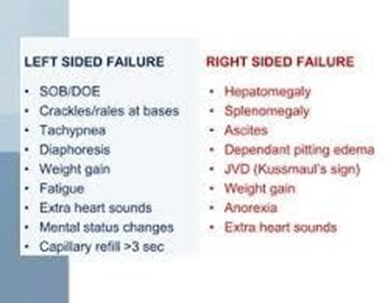Which dietary instruction is most important for the nurse to explain to a client who has had gastric bypass surgery?
Sip fluids with each meal.
Chew slowly and thoroughly.
Reduce intake of fatty foods.
Eat small frequent meals.
The Correct Answer is D
A. Sipping fluids with each meal may help prevent dehydration and promote hydration but is not the most important dietary instruction post-gastric bypass surgery.
B. Chewing slowly and thoroughly is important for digestion but is not specific to post-gastric bypass dietary needs.
C. Reducing intake of fatty foods is important for overall health but is not the most critical dietary instruction post-gastric bypass surgery.
D. Eating small frequent meals is crucial after gastric bypass surgery to prevent complications such as dumping syndrome, promote adequate nutrient absorption, and manage portion sizes effectively.
Nursing Test Bank
Naxlex Comprehensive Predictor Exams
Related Questions
Correct Answer is D
Explanation
A. Palpating the right flank for tenderness is essential to assess for possible renal involvement, such as a kidney infection or kidney stone, which could be causing the urinary symptoms and right lower back pain. However, it is not the initial step.
B. Testing the urine for the presence of hematuria is important in assessing for potential urinary tract infection or other renal pathology but does not directly address the cause of the right lower back pain.
C. Evaluating the urine for a strong odor may provide information about a possible urinary tract infection, but it is not the most immediate intervention for addressing the client's symptoms, compared to measuring the vital signs.
D. Measuring the temperature and pulse rate is important for identifying any signs of systemic infection or inflammation that could be contributing to the patient's symptoms.
Correct Answer is B
Explanation
A. Internal bleeding may present with symptoms such as hypotension, tachycardia, and signs of blood loss, but it typically does not cause pitting edema or jugular venous distention.
B. Right-sided heart failure can cause systemic venous congestion, leading to pitting edema of the lower extremities and jugular venous distention due to increased central venous pressure.

C. Cardiac tamponade presents with Beck's triad (hypotension, distended neck veins, muffled heart sounds) and is typically more acute in onset compared to the gradual development of symptoms seen in right-sided heart failure.
D. Left ventricular dysfunction primarily causes symptoms of pulmonary congestion, such as dyspnea, orthopnea, and crackles, rather than pitting edema and jugular venous distention.
Whether you are a student looking to ace your exams or a practicing nurse seeking to enhance your expertise , our nursing education contents will empower you with the confidence and competence to make a difference in the lives of patients and become a respected leader in the healthcare field.
Visit Naxlex, invest in your future and unlock endless possibilities with our unparalleled nursing education contents today
Report Wrong Answer on the Current Question
Do you disagree with the answer? If yes, what is your expected answer? Explain.
Kindly be descriptive with the issue you are facing.
